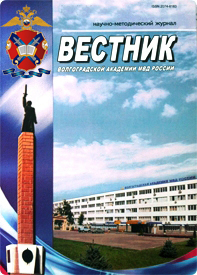The article is devoted to the principle of presumption of innocence in criminal procedure. The author assumes that conceptual meaning and purpose of presumption of innocence directly depends on the model of criminal proceedings where presumption of innocence implements its action. For example, in the adversarial model of proceedings where competition is self-sufficient, a goal in itself and precludes objective truth, presumption of innocence is „contested“, it serves not for defense of an accused person, but for determination of a winner in a procedural dispute of parties. The author proves that this model of criminal procedure aims at statement: if prosecution was able to destroy presumption of innocence of an accused person, i.e. if it was stronger than defense. While in the objective and true model of criminal procedure presumption of innocence is oriented to establishment of the objective truth. The article considers presumption of innocence as quasi-presumption, as an antipode countervailing the current presumption of guilt of an accused person. Presumption of innocence precludes prosecutorial bias and unilateralism in criminal investigation and trial on merits. The author proceeds on the basis that presumption of innocence reveals its actual essence in objective and true model of procedure and that this model is higher, improved and more objective type of criminal proceedings compared to adversarial (winning/loosing) model of procedure.
), adversarial (winning/loosing) model of criminal procedure, principle of presumption of innocence, quasi-presumption, presumption of guilt, objective truth, technical legal truth (the truth of the strongest)
1. Pechnikov G. A. Dialekticheskie problemy istiny v ugolovnom processe: monografiya. 2-e izd., ispr. i dop. Volgograd: VA MVD Rossii. 2010. 312 s.
2. Mihaylovskaya I. B. Nastol'naya kniga sud'i po dokazyvaniyu v ugolovnom processe. M.: TK Velbi; Prospekt, 2006. 192 c.
3. Kaminskaya V. I. Uchenie o pravovyh prezumpciyah v ugolovnom processe / otv. red.: N. N. Polyanskiy. M.-L.: Izd-vo AN SSSR, 1948. 132 c.
4. Blinkov A. P. Principy sostyazatel'nogo i ob'ektivno-istinnogo ugolovnogo processa v deyatel'nosti sledovatelya: sravnitel'nyy analiz: dis. … kand. yurid. nauk: 12.00.09. Volgograd: VA MVD Rossii, 2018. 242 s.
5. Fel'dshteyn G. S. Lekcii po ugolovnomu sudoproizvodstvu // Soch. G. S. Fel'dshteyna. M.: V. Rihter, 1915. VIII, 433 s.
6. Strogovich M. S. Priroda sovetskogo ugolovnogo processa i princip sostyazatel'nosti. M.: Yurid. izd-vo NKYu SSSR, 1939. 151 c.
7. Luneev V. V. Epoha globalizacii i prestupnost'. M.: Norma, 2007. 272 c.
8. Ugolovnyy process Rossii: uchebnik / A. S. Aleksandrov [i dr.]; nauch. red. V. T. Tomin. M.: Yurayt, 2003. 821 s.
9. Orlov Yu. I. Osnovy teorii dokazatel'stv v ugolovnom processe: nauch.-prakt. posobie. M.: Prospekt, 2001. 144 c.
10. O vnesenii izmeneniy v Ugolovno-processual'nyy kodeks Rossiyskoy Federacii v svyazi s vvedeniem instituta ustanovleniya ob'ektivnoy istiny po ugolovnomu delu: proekt feder. zakona // Sledstvennyy komitet Rossiyskoy federacii: sayt. URL: http://www.sledcom.ru (data obrascheniya: 10.03.2018).
11. Kiyaschenko L. P., Tischenko P. D. Aporii sovremennogo gumanitarnogo znaniya // Sinergeticheskaya paradigma. Kognitivno-kommunikativnye strategii sovremennogo nauchnogo poznaniya / red.-sost. O. N. Astaf'eva, P. D. Tischenko; otv. red. L. P. Kiyaschenko. M.: Progress-Tradiciya, 2004. 560 s.
12. Mal'cev G. V. Social'nye osnovaniya prava. M.: Norma, 2007. 800 c.









